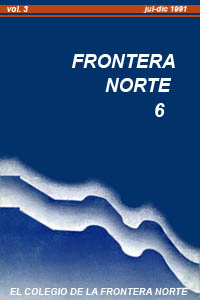North american free trade, public goods, and asymmetrical bargaining: the strategic choices for Canada
Main Article Content
Abstract
Article Details
Authors publishing work in this journal agree to the following conditions:
Authors retain copyright and assign first publication rights to the journal Frontera Norte (RFN), with the texts registered under an Attribution-NonCommercial-NoDerivatives 4.0 International Creative Commons license (CC BY-NC-ND 4.0), which allows third parties to use published material provided they give credit to the authors and acknowledge this journal as the first publisher.
They authorize the reproduction, publication, translation, communication, and transmission of their paper and all accompanying material, publicly and in any form and by any means; its public distribution in as many copies as required; and public communication thereof in any form, including making it available to the public through electronic means or any other technology, and solely for dissemination and scientific, cultural, and non-commercial purposes.
Authors may enter into further independent contractual agreements for the non-exclusive distribution of the version of the paper published in this journal (for instance, to include it in an institutional repository or personal webpage, or publish it in a book), provided it is not for commercial purposes and they clearly state that the work was first published in Frontera Norte (RFN) [and add the corresponding bibliographical record: Author/s (Year). Title of paper. Frontera Norte, volume (number), pp. doi: xxxx].
To that end, authors must submit the form assigning ownership of first publication rights, duly completed and signed. This document is to be uploaded in PDF format as a complementary file on the OJS platform.
This work is released under an Attribution-NonCommercial-NoDerivatives 4.0 International Creative Commons license (CC BY-NC-ND 4.0)..
References
Aggarwal, V.K. and P. Allan (forthcoming) "The Origin of Games: A Theory of Ordinal Preferences and Games," in M. Intriligator and U. Luterbacher (eds.). Cooperative Models in International Relations Research, :Dordrecht Kluwer.
Baer, M.D.(Fall 1991) "North American Free Trade," Foreign Affairs, 70(4): 132-149.
Baker, J.A. III (January/February 1988) "The Geopolitical Implications of the U.S.-Canada Trade Pact, " The International Economy. Washington D.C.: International Economy Publications, Ltd.
Cameron, M.A. (1991) "Canada and Latin America," in F.O. Hampson and C.J. Maule, eds.. After the Cold War: Canada Among Nations 1990-91. Ottawa: Carleton University Press.
------- and L. Macdonald (1990) "Consultative Session on NAFTA: A Conference Report," Ottawa: The North-South Institute.
Department of Finance(Canada). (July 1990) "Canada and the Mexico-United States Trade Agreement," Working Paper. Ottawa: International Economic Relations/International Trade and Finance Branch.
Eden, L. and M. Molot (1991) "From Silent Integration to Strategic Alliance: The Political Economy of North American Free Trade," Occasional Papers. Ottawa: Centre for Trade Policy and Law.
Gilpin, R.(1987) The Political Economy of International Relations. Princeton: Princeton University Press.
Gowa, J.(1990) "An Epitaph for Hegemonic Stability Theory? Rational Hegemons, Excludable Goods, and Small Groups," in J.S. Odell and T.D. Willett, eds.. International Trade Policies: Gains from Exchange between Economics and Political Science. Ann Arbor: University of Michigan Press.
———— (December 1989) "Bipolarity, Multipolarity, and Free Trade," American Political Science Review, 83(4): 1245-1256.
Grieco, J.M.(August 1988a) "Realist Theory and the Problem of International Cooperation: Analysis with an Amended Prisoner's Dilemma Model." Journal of Politics 50:600-24.
Grieco, J.M.(Summer 1988b) "Anarchy and the limits of cooperation: a realist critique of the newest liberal institutionalism," International Organization. 42(3):485-507.
Grinspun, R.(1991) "North American Free Trade Area: A Critical Economic Perspective," Paper presented at Facing North/Facing South: A Multidisciplinary Conference on Contemporary United States-Canadian-Mexican Relations, The University of Calgary, May 2-5.
Hart, M.(1990) A North American Free Trade Agreement: The Strategic Implications for Canada, Ottawa: Centre for Trade Policy and Law and Institute for Research on Public Policy.
Helleiner, G.K.(1990) "Considering A U.S.-Mexican Free Trade Area," Paper prepared for a conference on "Mexico's Trade Options in the Changing International Economy," Universidad Tecnológica de México, Mexico City, June 11-15.
Krasner, S.D.(1976) "State Power and the Structure of International Trade," World Politics, 28(3):317-43.
Krasner, S.D.(1983) "Structural causes and regime consequences: regimes as intervening variables," in S.D. Krasner, ed.. International Regimes. Ithaca: Cornell University Press.
Kreklewich,R.J. (1991) "North American Integration: Interplay of World Order, State and Production," Occasional Papers. York University: Centre for Research on Latin America and the Caribbean.
Lipsey, R.G.(August 1990) "Canada at the U.S.-Mexico Free Trade Dance: Wallflower or Partner?" C.D. Howe Institute Commentary. No. 20. Toronto: C.D. Howe Institute.
Lipsey, R.G.(1988) "Sovereignty," in D.M. McRae and D.P. Steger, eds.. Understanding the Free Trade Agreement. Halifax: Institute for Research on Public Policy.
Putnam, R.D.(1988) "Diplomacy and domestic politics: the logic of two-level games," International Organization. 42(3):427-60.
Silva-Herzog F., J.(1991) "Mexico and the World: Opportunities and Risks in the 1990s," in R. Roett ed., Mexico's External Relations in the 1990s Boulder: Lynne Rienner Publishers.
Smith, M.G.(1990) "The Mexico, United States and Canada Trade Talks: Getting off on the Right Foot?" Occasional Papers. Ottawa: Centre for Trade Policy and Law.
United States International Trade Commission, (February 1991) The Likely Impact on the United States of a Free Trade Agreement with Mexico, Report to the Committee on Ways and Means of the United States House of Representatives and the Committee on Finance of the United States Senate. Washington, D.C.
Weintraub, S.(Autumn 1990) "The North American Free Trade Debate," The Washington Quarterly. 13(14): 119-130.
Weintraub, S.(1984) Free Trade Between Mexico and the United States? Washington D.C.: The Brooking Institution.
Wilkinson, B.W.(1991) "Regional Trading Blocs: Fortress Europe versus Fortress North America," in D. Drache and M.S. Gertler, eds., The New Era of_Global Competition: State Policy and Market Power. Montreal and Kingston: McGill-Queen's University Press.
Wonnacott, R.J.(September 1990) "Canada and the U.S.-Mexico Free Trade Negotiations," C.D. Howe Institute Commentary. No. 21. Toronto: C.D. Howe Institute.

